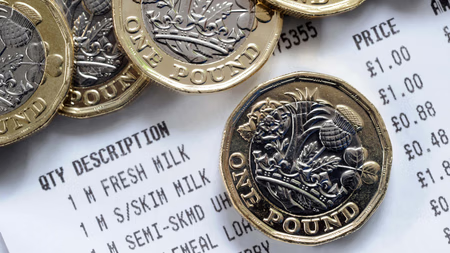Unexpected Rise: UK Inflation Hits 3.6% in June
UK inflation unexpectedly jumped to 3.6% in the 12 months to June 2025, up from 3.4% in May, marking the highest rate since January 2024, according to the Office for National Statistics (ONS). The surprise increase, which exceeded economists’ expectations of a steady 3.4%, has sparked concerns about persistent price pressures and cast doubt on the Bank of England’s plans for an interest rate cut in August.
The rise was driven primarily by transport costs, with motor fuel prices falling less sharply than last year—petrol dropped by just 0.5p per litre compared to a 3p decline in June 2024, and diesel fell by 0.6p versus 4.8p a year ago. Air fares surged by 7.9% between May and June, the largest June increase since 2018, while rail fares and vehicle maintenance costs also contributed. Food and non-alcoholic beverage inflation climbed to 4.5%, the highest since February 2024, with beef (20.4%), butter (20.0%), and chocolate (16.3%) seeing double-digit rises, though olive oil (-9.6%) and rice (-3.1%) prices fell.
Core inflation, excluding volatile food and energy, rose to 3.7% from 3.5%, signaling persistent domestic price pressures. ONS acting chief economist Richard Heys noted, “Inflation ticked up in June, driven mainly by motor fuel prices, which fell only slightly compared with a much larger decrease last year.” Food price inflation, while below its 2023 peak of 19.2%, remains a concern for households.
The data has dampened hopes for an imminent rate cut, with the Bank of England’s Monetary Policy Committee expected to hold rates at 4.25% in August, despite earlier hints from Governor Andrew Bailey of a “gradual and careful” easing. Analysts, including PwC’s Adam Deasy, suggest the Bank may overlook the volatility due to a weakening jobs market and two consecutive months of economic contraction in May. However, Peter Stimson of MPowered Mortgages warned, “This jump in CPI isn’t just a blip—it’s a barrier to cutting interest rates.”
Chancellor Rachel Reeves expressed disappointment, stating, “Working people are still struggling with the cost of living, and we have more work to do.” Critics, including shadow chancellor Mel Stride, blamed Labour’s tax policies, claiming they “drive up inflation, causing mortgage misery for millions.” Posts on X echoed mixed sentiments, with some attributing the rise to Labour’s budget and others noting global economic unpredictability, including U.S. tariffs.
